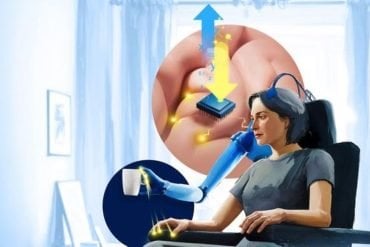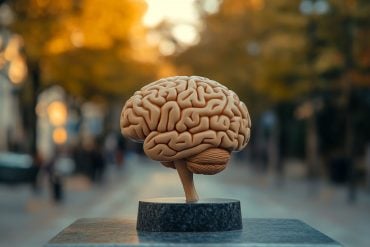Summary: Researchers have alleviated schizophrenia symptoms in mice by restoring the ErbB4 receptor.
Source: Case Western Reserve University.
Despite extensive research efforts, schizophrenia remains one of the least understood brain disorders. One promising area of research is in receptors on the surfaces of brain cells that help sense growth factors. But there’s been a problem: in previous schizophrenia studies, researchers have genetically manipulated brain cell receptors in very young mice. Schizophrenia usually affects adults.
In a recent issue of the Proceedings of the National Academy of Sciences, Lin Mei, MD, PhD, asked, does all the tinkering in young mice hamper their brain development, causing schizophrenia-like symptoms? Or, do their brain cells develop normally, but in adulthood struggle to communicate? Researchers need to know whether to focus their efforts on brain cell development or communication, or both, because the answer to these questions implies different therapeutic approaches.
In the new study, Mei, professor and chair of neurosciences at Case Western Reserve University School of Medicine, led an international team of neuroscientists. The team included Mei’s long-time collaborator, Wen-Cheng Xiong, PhD, professor of neurosciences, and first authors Hongsheng Wang and Wenbing Chen, graduate students, all of CWRU. Additional collaborators included researchers at Nanchang University and Guangzhou Medical University in China, and neuroscientists from the Medical College of Georgia at Augusta University.
Together, the researchers studied a brain cell receptor–ErbB4–whose level is altered in adults with schizophrenia. ErbB4 helps maintain an inhibitory neurotransmitter in the brain–GABA–that prevents brain cells from overreacting and keeps fear and anxiety in check. The researchers have shown previously that ErbB4 mutations change signals inside brain cells that lead to schizophrenic symptoms in mice.
“When ErbB4 is mutated early on in mice, it impairs brain circuit wiring. It also impairs GABA transmission in adult animals, causing schizophrenic symptoms,” said Mei. “But previous models are unable to distinguish whether deficits are from abnormal development in young mice brains, or abnormal transmission developed later on.” Mei’s new study shows schizophrenic symptoms come from deficits in how brain cells communicate during adulthood, regardless of whether or not they fully developed.
To find their answers, Mei’s team genetically engineered two new mouse models of schizophrenia. In the first, the researchers treated mice with a chemical that switches “off” the gene encoding ErbB4. “Using inducible knock-out mice, we depleted ErbB4 only in adult animals, and showed that this impairs behavior,” said Mei. In mice missing ErbB4 only in adulthood, brain cell development and appearance were normal, but symptoms persisted. The experiment suggested schizophrenic symptoms in adult mice were unrelated to abnormal brain cell development.

In the second mouse model, the receptor was missing in mice from the beginning, hampering brain cell development. The researchers used the same genetic switch to turn ErbB4 “on” in adulthood–in essence, recovering it. “In recovery knock-out mice, ErbB4 is missing during development and thus the mice have crippled brain circuits. Yet, when ErbB4 is restored on a malformed circuit, mice scored better in behavioral tests,” said Mei. Even with underdeveloped brain cells, schizophrenic symptoms could be alleviated simply by adding ErbB4.
Mei’s team found restoring ErbB4 receptors reduced hyperactivity, and normalized fear responses in adult mice. “ErbB4 is a risk factor for schizophrenia,” said Mei. “This study shows correcting ErbB4 signaling could be therapeutic in relevant patients.”
The results in the two mouse models confirm that ErbB4 is critical to how brain cells communicate during adulthood. The nuanced distinction could lead to new therapeutics designed to improve brain cell signaling associated with the ErbB4 receptor. In particular, therapeutics that improve how GABA neurotransmitters regulate brain cell activity.
“Restoring ErbB4 could be beneficial to patients–even those with malformed brain circuitry,” said Mei. “We are now looking into how restoring ErbB4 improves neurotransmitter signaling inside brain cells, including those relevant to other psychiatric disorders, such as attention deficit hyperactivity disorder and major depression.”
Funding: This research was supported in part by grants from the National Institutes of Health (MH083317, MH109280, NS082007, and NS090083 to L.M.; and AG051773 and AG051773 and AG045781 to W-C.X.).
Source: Ansley Gogol – Case Western Reserve University
Publisher: Organized by NeuroscienceNews.com.
Image Source: NeuroscienceNews.com image is in the public domain.
Original Research: Abstract for “Genetic recovery of ErbB4 in adulthood partially restores brain functions in null mice” by Hongsheng Wang, Fang Liu, Wenbing Chen, Xiangdong Sun, Wanpeng Cui, Zhaoqi Dong, Kai Zhao, Hongsheng Zhang, Haiwen Li, Guanglin Xing, Erkang Fei, Bing-Xing Pan, Bao-Ming Li, Wen-Cheng Xiong, and Lin Mei in PNAS. Published November 29 2018.
doi:10.1073/pnas.1811287115
[cbtabs][cbtab title=”MLA”]Case Western Reserve University”Schizophrenia Symptoms Alleviated: Mouse Study.” NeuroscienceNews. NeuroscienceNews, 30 November 2018.
<https://neurosciencenews.com/schizophrenia-alleviated-10280/>.[/cbtab][cbtab title=”APA”]Case Western Reserve University(2018, November 30). Schizophrenia Symptoms Alleviated: Mouse Study. NeuroscienceNews. Retrieved November 30, 2018 from https://neurosciencenews.com/schizophrenia-alleviated-10280/[/cbtab][cbtab title=”Chicago”]Case Western Reserve University”Schizophrenia Symptoms Alleviated: Mouse Study.” https://neurosciencenews.com/schizophrenia-alleviated-10280/ (accessed November 30, 2018).[/cbtab][/cbtabs]
Abstract
Genetic recovery of ErbB4 in adulthood partially restores brain functions in null mice
Neurotrophic factor NRG1 and its receptor ErbB4 play a role in GABAergic circuit assembly during development. ErbB4 null mice possess fewer interneurons, have decreased GABA release, and show impaired behavior in various paradigms. In addition, NRG1 and ErbB4 have also been implicated in regulating GABAergic transmission and plasticity in matured brains. However, current ErbB4 mutant strains are unable to determine whether phenotypes in adult mutant mice result from abnormal neural development. This important question, a glaring gap in understanding NRG1–ErbB4 function, was addressed by using two strains of mice with temporal control of ErbB4 deletion and expression, respectively. We found that ErbB4 deletion in adult mice impaired behavior and GABA release but had no effect on neuron numbers and morphology. On the other hand, some deficits due to the ErbB4 null mutation during development were alleviated by restoring ErbB4 expression at the adult stage. Together, our results indicate a critical role of NRG1–ErbB4 signaling in GABAergic transmission and behavior in adulthood and suggest that restoring NRG1–ErbB4 signaling at the postdevelopmental stage might benefit relevant brain disorders.







